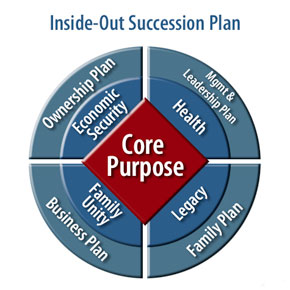When financial advisors must deal with powerful client emotions.
Key Takeaways:
- While economic security and health are important motivators for a client to discuss financial planning, his or her family unity and legacy are often stronger drivers.
- Seeking validation and leaving a legacy are huge motivators for entrepreneurs.
- Rather than telling the entrepreneur what to do, you can have greater influence at lower risk by asking open-ended questions - you just need to know which ones to ask.
- Inside-Out Succession Planning helps advisors ask entrepreneurs difficult questions about their core purpose, family unity and what they desire as a legacy
Last time, we discussed countertransference and how to recognize clues that you've been asked to "ride the elephant" of handling powerful client emotions. Here we'll discuss Inside-Out Succession Planning and how to broach the subject of a family business consultant.
You recognize the clues, but how do you talk about bringing in a family business consultant?Technical professionals generally help clients through the planning process in one of four areas: (1) a business plan, (2) an ownership plan, (3) a management and leadership plan or (4) a family plan. Those four areas are represented on the outer ring of my succession planning model.

But from my perspective, the best place to start is in the center of the model - the core purpose. Understanding a client's core purpose gives you many insights about how to approach an entrepreneur who has concerns. The second ring (in darker blue) represents what motivates owner-entrepreneurs to do succession planning. Certainly, economic security and health are important motivators, but equally if not more important are concerns about family unity and legacy.
Family unity is important because parents don't want to be in their 60s or 70s and have their family and family business torn apart by business and financial differences.
Similarly, a person's legacy is a powerful motivator. Laura Nash of Harvard Business School defines legacy as "your gift to the future to help others find future success." At some emotional level all entrepreneurs understand they are "playing the back nine." They realize that in order to continue their impact in the world they need to pass along their values, life learnings and other insights so that what is important to them lives on in their descendants.
Another aspect of legacy pertains to how someone feels they will be remembered. As people get older, they begin to wonder about whether their lives have meant something, whether their life has made a difference to anyone. This validation-seeking is a huge motivator for entrepreneurs.
That's why I developed the Inside-Out Succession Plan. It recognizes these motivations and uses them to calmly ask entrepreneurs critical and often emotional questions about their core purpose, the importance of their family's unity and what they desire as a legacy.
I engage the entrepreneur and spouse in discussions framed by their core purpose, family unity and legacy. I include the spouse because he or she is usually extremely influential. The spouse is often the one who seeks outside help to solve family business issues and can draw together all parties - entrepreneur, family members, technical professional and family-business consultant. This person can be your willing champion for bringing up emotional issues that resolve business expectations.
Rather than telling the entrepreneur what to do, you can have greater influence at lower risk by asking open-ended questions. Here are a few:
- What are your goals?
- How do you want to be remembered?
- What would happen if... ?
- Is there any possibility... ?
- How are you feeling about... ?
- What do you want?
- What are you willing to do to make that happen?
- How could you provide leadership to your family to have a family meeting to discuss the possibility of doing... ?
- What would happen if family members could forgive each other for what has happened?
- What are the pros and cons of using an outside resource to help the family discuss this matter?
These are just a sample of questions I regularly use. Use your own intuition to ask questions that help your client deal with the tough, emotional stuff.
ConclusionAnd if your palms get sweaty and the elephant is in the room, don't tackle the emotional issues alone. Feel free to email me with your questions (tomh@thehublergroup.com). I can help you create a strategy that will help your client - and you - glide successfully through emotional turbulence.
Read
Part One - Are You Trained to Ride the Elephant in the Room?